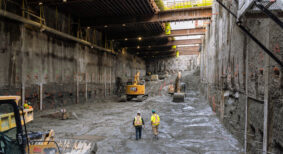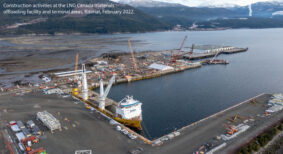Construction of liquefied natural gas (LNG) plants and related infrastructure will mean jobs and significant long-term economic windfall in British Columbia. But a possible B.C. labour shortage could cause problems for the province.
That is what a group of construction industry leaders heard when Rich Coleman, the minister responsible for natural gas development in B.C., outlined the opportunities and challenges associated with LNG prospects during the annual CEO breakfast at Buildex Vancouver 2014.
“Today we have generational opportunity in front of us. We sit on one of the largest reserves of natural gas in the world and we have more to explore,” he said, stressing that his government is focused on creating a new LNG export industry in B.C.
It is important for B.C. to explore opportunities outside of the North America market where prices have been “disastrously low”, such as Asia, because they need natural gas and it would mean billions of dollars in royalties alone, Coleman said.
Several companies have already spent $500 million in pre-development work in B.C., while two others have spent one billion dollars each. The final go-ahead decision on building plants and pipelines in the province will mean upward of $20 billion.
“Total investment in one LNG plant is $20 to $30 billion,” he said.
Having enough workers in place to build LNG plants and infrastructure is critical and will be a challenge. Coleman noted that a labour shortage for new LNG plants in Australia resulted in labour costs soaring and projects going over budget by 45 per cent.
“If these companies can’t be assured that there is labour … they’re not coming. (They are) not going through the experience they had in Australia,” he cautioned.
Because of the large number of skilled workers required, immigration will be essential to meeting the labour challenge. However, Coleman said that British Columbians, First Nations and Canadians will get “first shot at the jobs.”
According to a report commissioned by the government, LNG will mean 39,000 annual construction jobs over a 10-year period, along with 75,000 permanent operational jobs.
“Today in B.C., we have over 10 proposals for LNG plants. Six of them would be called mega plants,” Coleman said. “If all these things come together, we’ve got some challenges on our hand.”
Demand for labour is already a challenge with shipbuilding, smaller gas plants and other major projects across the province. The competitive nature for labour across western Canada is driving costs up, he said, noting even if every person graduating from high school in B.C. over the next five years goes into a trade, there will still be a shortage of about 50,000 skilled workers.
Coleman strongly encouraged the construction industry to get involved. One way to do that is to register at the LNG Buy B.C. program, a database to connect local companies with LNG investors.
“Construction is driving B.C.’s economy now, and it will have to help us drive the economy in the future,” Coleman concluded. “LNG is going to change the whole financial future of B.C. if successful.”
Cheryl Mah is managing editor of Construction Business.









